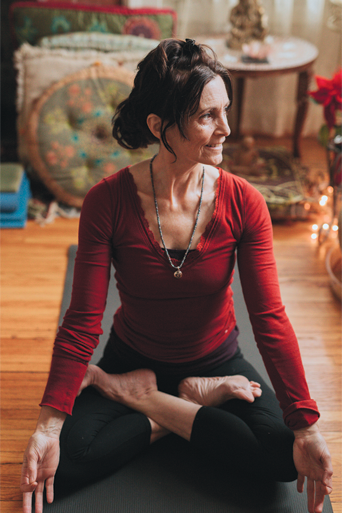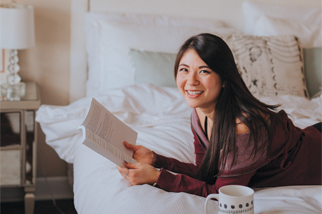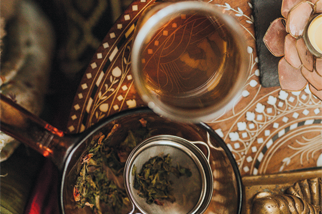A Nourishing Practice
Many on our team at Edible Columbus find meaning in the practice of yoga. In this issue, we asked three Columbus-based yoga practitioners how their yoga practice and nutritional preferences have informed each other. Here’s what they had to say.
Teresa Eigel
People usually turn to yoga to “fix” something—”I want to touch my toes,” “I want to feel less stressed,” etc. Yet we end up finding out that it’s so much more than we came for.
I practiced sporadically for several years. When I started practicing regularly, I was able to recognize how separate my physical and emotional bodies had become. My true relationship with my body was kind of scary and painful to come face-to-face with. My relationship with food was one of guilt and unworthiness. I tried all the diets and cleanses I could find. I wasn’t even really enjoying what I ate; all I cared about was that it was low in calories.
Yoga encouraged my process of working through all the emotions I had been forcing down. I finally slowed down enough to hear the back-and-forth dialogue that had been there all along when I consumed food. It taught me to just be gentler with myself, more forgiving. I started to actually enjoy cooking and eating.
Today I feel freedom. I am able to see food for its beauty and nourishment for our bodies. We are beautiful just the way we are now, nothing we need to fix. We deserve to find pleasure in food and in our lives.
Teresa Eigel has been a yoga practitioner for 11 years. She is an avid runner and cyclist. Now her “normal” diet consists mostly of fruits and vegetables, and plenty of sweet baked goods. Find her blog at peacelovewholefood.com and on Instagram and Facebook at @peace.love.wholefood.
Roderick Huelsman
I began practicing Ashtanga yoga in April of 2015. Six months later I became a vegan. Yoga and veganism are closely connected for me. Ahimsa or nonviolence is a governing principle in yoga and is the most important principle in veganism.
I met Taylor Hunt and he invited me to his Shala at Ashtanga Yoga Columbus (AYC). I fell in love with the practice and before long the thought of eating animals became weirder and weirder. When I first declared my veganism I knew that I couldn’t just live off of salad, and I didn’t want to eat a bunch of imitation meats. There was some trial and error in the beginning, but then through the community at AYC I was introduced to Ayurvedic medicine, learned about my dosha and refined my diet through research and listening to my body.
If I can’t convince you through my example to go vegan or to take up a daily Ashtanga practice, I do strongly urge you to reduce your usage of animal products, learn about your Ayurvedic dosha and exercise. These are my boring secrets to balanced and vital life.
Roderick Huelsman of Avery’s Kitchen is an entrepreneur spreading awareness about how satisfying and healthy plant-based eating can be. For information about future events follow @averyskitchen012018 on Instagram and Avery’s Plant Based Kitchen on Facebook.
Joanie Delph
As I gave in to an Ashtanga yoga practice, I noticed that my aches and pains were being replaced by strengthening pain, but in addition, my life was healing in ways I could not have imagined. My happiness was becoming stronger than my unhappiness.
There was more. Out of my yoga journey came an introduction to Ayurveda, which gave me “the food piece.” Considered “the sister to yoga,” Ayurveda taught that most disease starts with poor digestion and how to change these habits. Ayurveda encouraged me to pay attention to what foods I ate when, and to say “Thank you” when cutting a vegetable, appreciating its addition to my life, which could actually empower that food’s effect.
I developed the habit of running to comfort food soon after practice. Months later, those same foods became intolerable. “Why?” I asked my teacher. “This is very deep work, dear,” she said, “and initially we may turn to heavy foods and habits that curb emotions releasing from our yogic work. Later, the yoga starts teaching us what we need and don’t need in creative, various ways that are not always without frustration.”
Of course, she said all with a smile.
Yoga and food cannot be separated, as the true goal of yoga is to unite consciousness with the “self.” If we open to loving, healthful actions, whether we do them all or not, slowly, slowly the new habits might win.
Joanie Delph, Ashtanga yoga teacher and Ayurveda presenter, studies in India as well as the United States, to provide a well-rounded view of yoga and Ayurveda’s higher offerings in class and workshop format. She also enjoys cooking, food-growing, meditating and researching. Find Joanie on Facebook or email her at: Joanie.d@hotmail.com.













